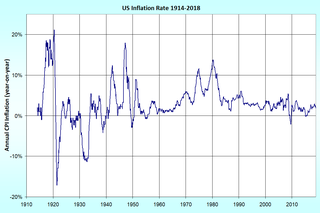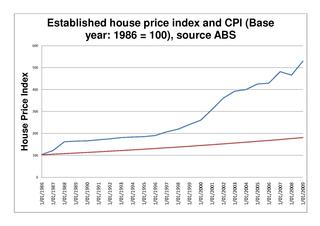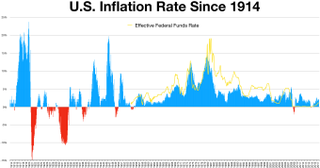History
It was the UK's target rate of inflation from October 1992 to December 2003. From June 1997, the Bank of England was given the task of setting interest rates to meet an inflation target of 2.5 per cent on the RPIX measure.

The Bank of England is the central bank of the United Kingdom and the model on which most modern central banks have been based. Established in 1694 to act as the English Government's banker, and still one of the bankers for the Government of the United Kingdom, it is the world's eighth-oldest bank. It was privately owned by stockholders from its foundation in 1694 until it was nationalised in 1946.
Mortgage interest payments were excluded from the inflation target because otherwise the Bank's behaviour would be distorted. Any rate rise from the Bank, aimed at bringing inflation lower, would have the side effect of raising interest payments on variable-rate mortgages, causing higher inflation on any broad measure such as RPI. Targeting RPI would thus create a vicious circle of higher rates, something avoided by using RPIX as the target.
In December 2003 the Bank's target measure was changed to the Consumer Price Index, or CPI, and the target was set at 2 per cent.

The Consumer Price Index (CPI) is the official measure of inflation of consumer prices of the United Kingdom. It is also called the Harmonised Index of Consumer Prices (HICP).

The economy of Canada is a highly developed mixed economy with 10th largest GDP by nominal and 16th largest GDP by PPP in the world. As with other developed nations, the country's economy is dominated by the service industry, which employs about three quarters of Canadians. Canada has the fourth highest total estimated value of natural resources, valued at US$33.2 trillion in 2016. It has the world's third largest proven petroleum reserves and is the fourth largest exporter of petroleum. It is also the fourth largest exporter of natural gas. Canada is considered an "energy superpower" due to its abundant natural resources and small population.

In economics, inflation is a sustained increase in the general price level of goods and services in an economy over a period of time.
When the general price level rises, each unit of currency buys fewer goods and services; consequently, inflation reflects a reduction in the purchasing power per unit of money – a loss of real value in the medium of exchange and unit of account within the economy. The measure of inflation is the inflation rate, the annualized percentage change in a general price index, usually the consumer price index, over time. The opposite of inflation is deflation.
Financial capital is any economic resource measured in terms of money used by entrepreneurs and businesses to buy what they need to make their products or to provide their services to the sector of the economy upon which their operation is based, i.e. retail, corporate, investment banking, etc.

In finance, a bond is an instrument of indebtedness of the bond issuer to the holders. The most common types of bonds include municipal bonds and corporate bonds.

A government bond or sovereign bond is a bond issued by a national government, generally with a promise to pay periodic interest payments called coupon payments and to repay the face value on the maturity date. The aim of a government bond is to support government spending. Government bonds are usually denominated in the country's own currency, in which case the government cannot be forced to default, although it may choose to do so. If a government is close to default on its debt the media often refer to this as a sovereign debt crisis.

Interest, in finance and economics, is payment from a borrower or deposit-taking financial institution to a lender or depositor of an amount above repayment of the principal sum, at a particular rate. It is distinct from a fee which the borrower may pay the lender or some third party. It is also distinct from dividend which is paid by a company to its shareholders (owners) from its profit or reserve, but not at a particular rate decided beforehand, rather on a pro rata basis as a share in the reward gained by risk taking entrepreneurs when the revenue earned exceeds the total costs.

Monetary policy is the process by which the monetary authority of a country, typically the central bank or currency board, controls either the cost of very short-term borrowing or the money supply, often targeting an inflation rate or interest rate to ensure price stability and general trust in the currency.
Price stability is a goal of monetary and fiscal policy aiming to support sustainable rates of economic activity. Policy is set to maintain a very low rate of inflation or deflation. For example, the European Central Bank (ECB) describes price stability as a year-on-year increase in the Harmonised Index of Consumer Prices (HICP) for the Euro area of below 2%. However, by referring to “an increase in the HICP of below 2%” the ECB makes clear that not only persistent inflation above 2% but also deflation are inconsistent with the goal of price stability.
A variable-rate mortgage, adjustable-rate mortgage (ARM), or tracker mortgage is a mortgage loan with the interest rate on the note periodically adjusted based on an index which reflects the cost to the lender of borrowing on the credit markets. The loan may be offered at the lender's standard variable rate/base rate. There may be a direct and legally defined link to the underlying index, but where the lender offers no specific link to the underlying market or index the rate can be changed at the lender's discretion. The term "variable-rate mortgage" is most common outside the United States, whilst in the United States, "adjustable-rate mortgage" is most common, and implies a mortgage regulated by the Federal government, with caps on charges. In many countries, adjustable rate mortgages are the norm, and in such places, may simply be referred to as mortgages.

Fixed income refers to any type of investment under which the borrower or issuer is obliged to make payments of a fixed amount on a fixed schedule. For example, the borrower may have to pay interest at a fixed rate once a year, and to repay the principal amount on maturity. Fixed-income securities can be contrasted with equity securities – often referred to as stocks and shares – that create no obligation to pay dividends or any other form of income.
In the United Kingdom, the retail prices index or retail price index (RPI) is a measure of inflation published monthly by the Office for National Statistics. It measures the change in the cost of a representative sample of retail goods and services.
The official cash rate (OCR) is the term used in Australia and New Zealand for the bank rate and is the rate of interest which the homogeneous central bank charges on overnight loans to commercial banks. This allows the Reserve Bank of Australia and the Reserve Bank of New Zealand to adjust the interest rates that apply in each country's economy. The OCR cannot be changed by transactions between financial institutions as this does not change the supply of money, only its location. Only transfers between the central bank and an institution can affect the OCR.

A mortgage loan or, simply, mortgage is used either by purchasers of real property to raise funds to buy real estate, or alternatively by existing property owners to raise funds for any purpose, while putting a lien on the property being mortgaged. The loan is "secured" on the borrower's property through a process known as mortgage origination. This means that a legal mechanism is put into place which allows the lender to take possession and sell the secured property to pay off the loan in the event the borrower defaults on the loan or otherwise fails to abide by its terms. The word mortgage is derived from a Law French term used in Britain in the Middle Ages meaning "death pledge" and refers to the pledge ending (dying) when either the obligation is fulfilled or the property is taken through foreclosure. A mortgage can also be described as "a borrower giving consideration in the form of a collateral for a benefit (loan)".
This page lists details of the consumer price index by country
The consumer price index (CPI) is the official measure of inflation in South Africa. One variant, the consumer price index excluding mortgage costs (CPIX), is officially targeted by the South African Reserve Bank and a primary measure that determines national interest rates.
This article provides background information regarding the subprime mortgage crisis. It discusses subprime lending, foreclosures, risk types, and mechanisms through which various entities involved were affected by the crisis.

The Australian property bubble is the subject of the Australian property market becoming significantly overpriced and due for a significant downturn. Some commentators, including one Treasury official, claim the Australian property market is in a significant bubble.
Inflation rate in India was 3.78% as of August 2015, as per the Indian Ministry of Statistics and Programme Implementation. This represents a modest reduction from the previous annual figure of 9.6% for June 2011. Inflation rates in India are usually quoted as changes in the Wholesale Price Index (WPI), for all commodities










